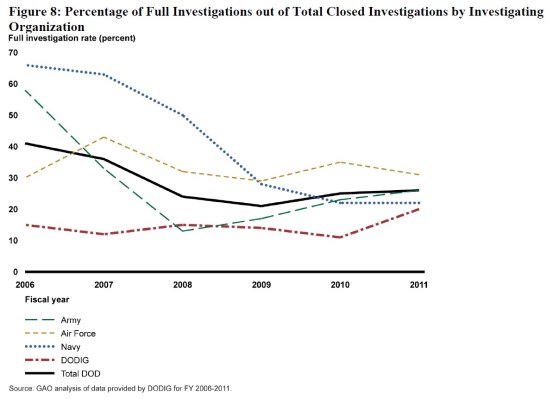You’re in the military. You blew the whistle. Something bad happened to your career. You ask your military service Inspector General or the big Department of Defense Inspector General (DoD IG) to investigate what you believe is reprisal. You’re in good hands, right? Well, maybe not.
There are numerous problems with how investigators are handling these cases, according to a draft Government Accountability Office (GAO) report that POGO has obtained. Although the main thrust of the report is on how it takes too long, on average, for members of the military alleging retaliation to get the results of an investigation, perhaps the most concerning finding is that unclear guidance “has resulted in investigators closing cases prematurely,” according to the draft. (UPDATE: GAO has moved up the release of the final version of the report to today; the final version is now out. There may be differences between the draft and the final.)
The guidance relates to “a key investigative question” on whether an adverse personnel action would be taken against the complainant in absence of whistleblowing. A “yes” answer to this question was estimated by GAO to be the cause, at least in part, for “65 percent of the cases closed between January 1, 2009 and March 31, 2011.”
The GAO did not say whether some of the cases prematurely closed might have been substantiated otherwise. The GAO did not try to assess whether the wrong conclusions were reached in any individual cases, according to the draft.
The unclear guidance comes on top of the higher evidentiary hurdle military whistleblowers face on this question compared to civilian government whistleblowers. As POGO noted last fall, this difference makes it more difficult for IGs to substantiate military whistleblower complaints of reprisal. And indeed few military reprisal allegations are substantiated. “For most of the reprisal allegations we reviewed,” an earlier 2003 GAO report stated, “management demonstrated to the satisfaction of an Inspector General that it would have taken the same course of action in the absence of a protected disclosure.”
According to the draft, historically around 80 percent of the whistleblower reprisal workload in DoD is related to military personnel, with civilian employees, contractors, and non-appropriated fund employees rounding out the rest of the DoD’s reprisal investigations caseload. The DoD IG is the central hub within the DoD’s whistleblower reprisal protection system. It investigates allegations of whistleblower reprisal and oversees the military service IGs’ reprisal investigations.
The draft report details several other problems, here are some:
- In some reprisal cases examined in an internal Department of Defense Inspector General (DoD IG) review, there was “insufficient documentation to support the findings or evidence that necessary investigative steps were completed.” Neither the internal review team nor the GAO assessed whether the evidence backed up the DoD IG’s conclusions in each case.
- The DoD took an average of 451 days to process a sample of reprisal cases examined by the GAO, well in excess of “the statutory requirement to provide reports on completed investigations 180 days after the date the allegation was made.” Furthermore, “in addition to not completing investigations in 180 days in most cases, DoD has not complied with the statutory reporting requirement to provide notification in those instances where the investigations go beyond 180 days, although it is taking steps to do so.”
- A DoD IG internal review, according to GAO, “found that the documentation demands required” during the whistleblower intake stage “could produce an onerous burden for the complainant and was inconsistent with DODIG guidance.” In response, the DoD IG is “instituting changes” to now have investigators speak directly with complainants “based on the standard that, ‘the alleged fact, if true, would raise the inference of reprisal,’” according to the draft GAO report.
- “The percentage of total cases that are fully investigated and substantiated has generally declined between fiscal year 2006 and the first half of fiscal year 2011, reaching its lowest point in both cases in fiscal year 2009.”
- “Only 1 in 5 servicemembers with whistleblower reprisal allegations substantiated by DODIG applied to BCMRs [Boards for Correction of Military Records] for relief during the time period we reviewed,” states the draft report. BCMRs are the main avenues servicemembers have to correct their military records. “Officials from DODIG, the service IGs, and the BCMRs indicated that they did not know the exact reason why so few servicemembers with substantiated reprisal allegations apply for relief.” However, the draft report notes that “Service and DODIG officials also stated that the length of time it takes for servicemembers to get their reprisal allegations substantiated may impact their willingness to engage in yet another process” and there “is a lack of understanding regarding the available remedies.” In addition, “the service BCMRs are not consistently identifying applicants who have substantiated reprisal cases as such and are therefore not providing all reprisal victims with the procedural privileges to which they are entitled.”
The draft, entitled “WHISTLEBLOWER PROTECTION: Actions Needed to Improve DOD’s Military Whistleblower Reprisal Program,” is dated January 31. The final version of the report is slated to be released at the end of February. The draft was sent to Defense Secretary Leon Panetta for comments from the DoD.



